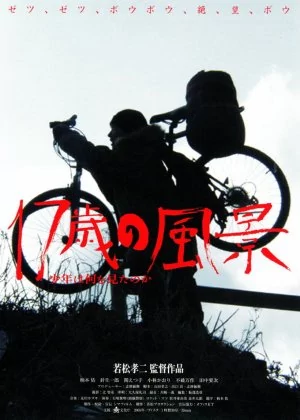Cycling Chronicles: Landscapes the Boy Saw

Japan ... where else do you find directors active in both erotic and experimental politically oriented cinema, sometimes even in the same film? What a country huh. Wakamatsu has almost 100 (99 to be precise) films to his name, most of them pinku (erotic) films. But every once in a while he rises up from the genre and takes a swing at politically themed artistic filming. Cycling Chronicles: Landscapes the Boy Saw [17-Sai no Fûkei - Shônen wa Nani o Mita no Ka] is such a swing, and not a bad one either.

I haven't seen any of Wakamatsu's pinku films, but did run into some of his older work while looking for interesting classics. Around 1970 he produced a few films quite hard to categorize. Raw, stylized, often political statements revolving around the youth of Japan. Go Go Second Time Virgin quickly became one of my all-time favorite classic films, Landscapes the Boy Saw sees Wakamatsu relive some of that former glory.
Still, some things have changed since the 70s. Landscapes is less experimental and lies closer to more standardized arthouse fare. It has a more classical feel to it compared to Wakamatsu's earlier experiments. Putting that aside, it's still a film that will cater to a very specific audience and will leave many bored and unsure of what they have just watched. At the core of the film stands Tasuku Emoto, a young, talented actor who has risen to moderate stardom these last couple of years. He doesn't ave too much work in this film, but what he does, he does particularly well. He plays the role of a young guy parting from his former life after going through a big, traumatic event. The film keeps the exact circumstances of his leave a little vague, though an early conversation between a couple of boys in a noodle shop hint at the grim events that made him leave his home. The audience catches up with Tasuku as he takes his bike and starts his journey.

If this sounds like an interested setup, be warned that this is about all there is. Even though the film is thematically rich, the narrative is as slim as can be. The bulk of the film is composed of scenes with Tasuku riding his bicycle. In the snow, near the ocean, on the beach, on the mountains, more snow, more roads, passing villages and tunnels. Along the road Tasuku runs into several people. Most of them have little to say, but one particular sequence with an old man is prolonged to explain a little about Japanese society and its recent history. The scene reminded me of Koreeda's After Life, as it holds that same fake-but-almost-real documentary feel to it. Together with the ending it's probably the best scene of the film, though Wakamatsu does take his political stances a little too far.
The scene marks also the weakness of this film. Even though Wakamatsu has quite a few things to say, he can be a little too direct in expressing them. Dialogues are often mere constructions for expressing his political and social views, which sometimes clashes with the semi-documentary style of the film, taking away from the realness of the characters. These scenes are quite rare though, and often overlap with more shots of Tasuku riding his favored means of transportation, but they still bothered me on one or two occasions.
Wakamatsu succeeds in giving his film a documentary feel while keeping the visuals very attractive and stylized. Landscape photography is magnificent, with plenty of awesome views as Tasuku rides through the different sceneries. The soundtrack too is quite impressive, with softer, dreamy background music and folk-singer Kazuki Tomokawa (remember the folk-singer from Izo?) rasping through from time to time. This mix creates a very raw, primitive effect adding to the mental image of the boy. Equally impressive is the way Tasuku's panting is always at the front of the soundtrack. While the images can be particularly dreamy and subdued, the panting always reminds us of the boy's impressive efforts.

As the film progresses more and more information is given about Tasuku's leave. There are no real surprises here, but it does give some body to his superhuman journey. It becomes clear he's not really running away from anything, he's simply pushing himself trying to find his limits. When his bike finally breaks down he simply picks it up, flicks it over his shoulder and carries on by foot. His journey is not about distance, but time and effort. Though I will not give away the ending, I will say it is pretty impressive to watch even though it gives you very little answers. Which is actually not a bad thing, as Wakamatsu himself has already given enough answers himself during the film.
The ending leaves room for interpretation and, in a similar way as Elephant did, seems to say that even though you can come up with plenty of reasons, the truth of the fact will probably never be really understood. The film shares more common ground with Van Sant's recent trilogy as Tasuku's journey is not quite unlike the one in Gerry. It's an impressive film if you can get yourself past the lack of narrative and the somewhat direct tone of the director. It has the power to raise some interesting questions and leaves plenty of open ground to ponder.
Cycling Chronicles: Landscapes the Boy Saw is pretty inaccessible (and hard to come by), but if you are looking for a film that slows you down for the course of its running time and leaves you with something to think about while looking at impressive imagery and striking you with an impressive soundtrack, this might just be your thing. Wakamatsu still has it, though it's quite obvious that somewhere along the line he lost his long hair and leather jacket.